Personalized quotes that speak your customer’s language—and their budget.
Quote personalization transforms static proposals into dynamic, customer-specific experiences that increase close rates by up to 30%. Modern CPQ platforms enable sales teams to deliver tailored pricing, relevant content, and industry-specific templates automatically. Companies leveraging personalized quoting see faster sales cycles, higher deal values, and improved customer satisfaction. The key lies in implementing rules-driven personalization that scales across distributed sales teams while maintaining pricing accuracy and approval workflows.
Ready to see how personalized quoting can transform your sales process? Schedule a demo to explore dynamic CPQ capabilities tailored to your industry.
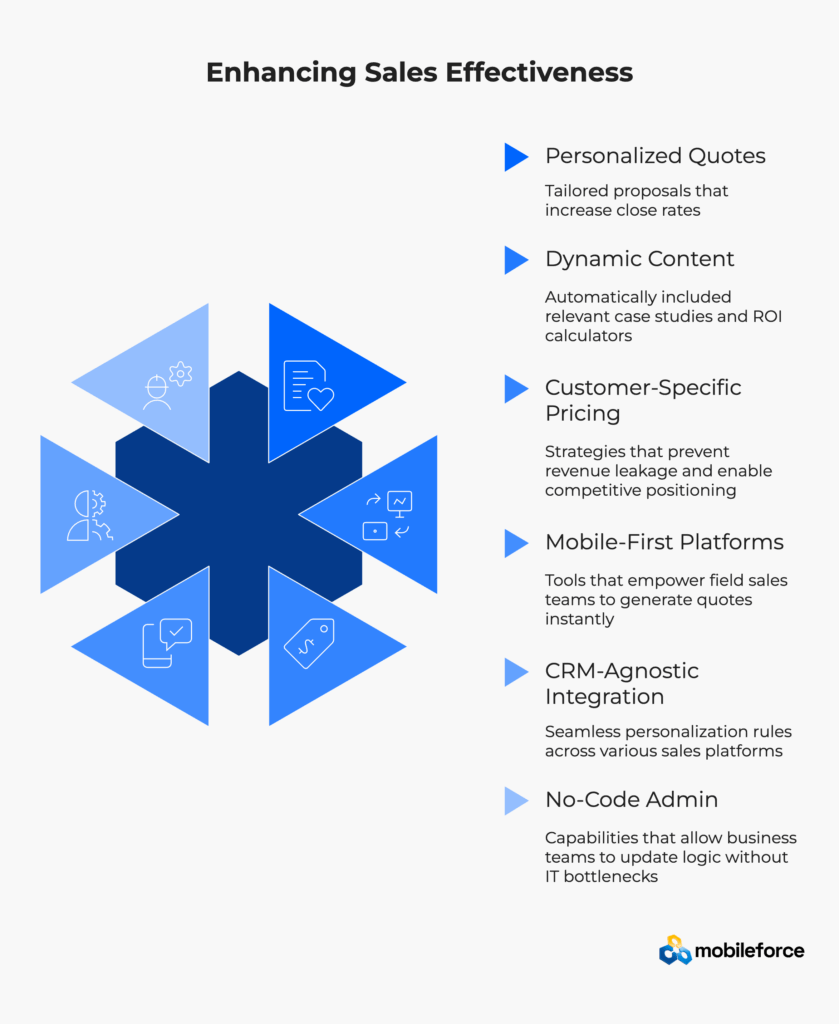
“We’ve moved from a world where buyers had three options to one where they have 300,” notes Gartner’s latest B2B buying research. This explosion of choice means prospects expect the same tailored experience in B2B transactions that they receive as consumers.
Yet most organizations still struggle with this reality. Sales reps spend hours crafting proposals in Word documents, copying and pasting pricing from spreadsheets, and hoping their quotes reach decision-makers before competitors do. The disconnect is striking. While marketing teams invest millions in personalization engines for websites and email campaigns, sales teams often work with static templates that haven’t been updated since 2019.
The stakes couldn’t be higher. Aberdeen Group research shows that companies with strong quote personalization capabilities achieve 27% higher win rates and 38% faster time-to-close compared to those using generic approaches. The question isn’t whether to personalize quotes—it’s how to do it at scale without sacrificing speed or accuracy.
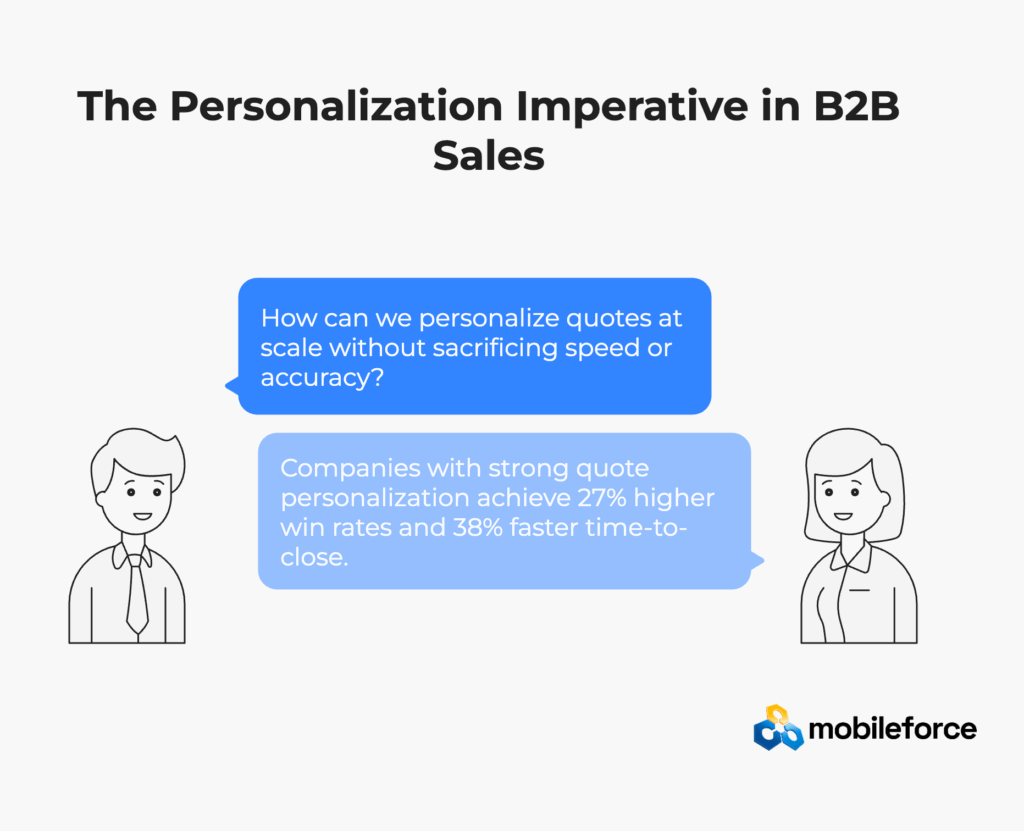
Quote personalization goes far beyond inserting a customer’s logo into a PDF template. True personalization involves three interconnected elements that work together to create compelling, customer-specific proposals.
Dynamic Content Adaptation represents the most visible aspect of personalization. When a sales rep generates a quote for a manufacturing prospect, the proposal automatically includes relevant case studies from similar companies, product configurations that match their industry requirements, and implementation timelines based on their operational complexity. The same CPQ system might present entirely different content to a SaaS company, emphasizing subscription models, integration capabilities, and scalability metrics.
Customer-Specific Pricing Logic forms the backbone of effective personalization. Rather than applying blanket discounts or hoping sales reps remember complex pricing rules, modern CPQ platforms automatically calculate customer-specific rates based on contract history, volume commitments, partner relationships, and competitive situations. A long-term customer with a multi-year agreement receives different pricing than a new prospect, and these calculations happen instantly without manual intervention.
Contextual Product Recommendations complete the personalization triangle. The system analyzes the customer’s existing technology stack, previous purchases, and stated requirements to suggest complementary products or services. This isn’t just upselling—it’s providing genuinely helpful recommendations that solve customer problems while increasing deal value.
Personalization Element | Traditional Approach | Modern CPQ Approach |
Content Selection | Manual copy/paste from templates | Rules-driven dynamic insertion |
Pricing Calculation | Spreadsheet lookups | Automated customer-specific rates |
Product Recommendations | Sales rep intuition | Data-driven suggestion engine |
Approval Workflows | Email chains and phone calls | Automated routing with audit trails |
Discover how automated personalization can accelerate your quoting process. Schedule a consultation to see real-world implementations.
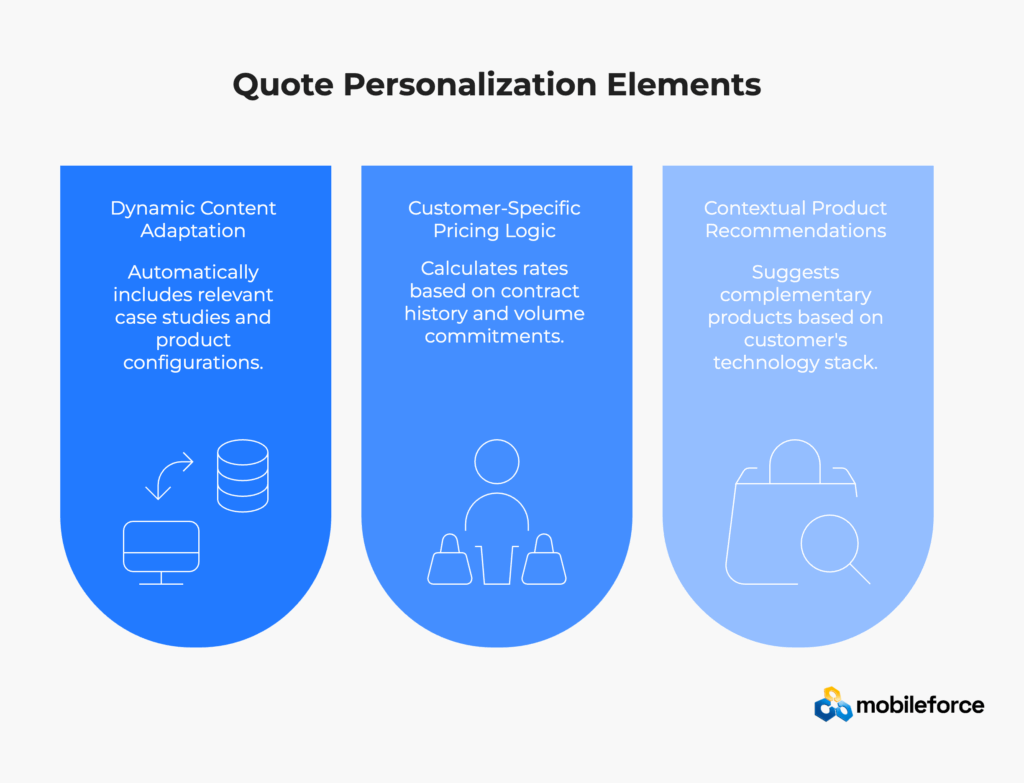
The most successful quote personalization strategies treat content as a living, breathing entity that adapts based on who’s reading it and what they care about. This approach requires sophisticated content management capabilities that go well beyond traditional document generation.
Consider how HubSpot’s research on buyer behavior reveals that 73% of buyers want to see content specifically relevant to their industry and use case. Generic quotes simply don’t cut it anymore. When a pharmaceutical company evaluates new software, they want to see compliance frameworks, validation processes, and regulatory considerations. That same software proposal for a retail company should emphasize inventory management, seasonal scaling, and customer experience metrics.
Rich Media Integration transforms static quotes into interactive experiences. Modern CPQ platforms embed product demonstration videos directly into proposals, allowing prospects to visualize solutions without scheduling separate demo calls. ROI calculators use customer-specific data to project value, creating compelling business cases that resonate with financial decision-makers. Interactive product configurators let buyers explore options and see real-time pricing impacts, increasing engagement while reducing back-and-forth clarification emails.
Industry-Specific Templates serve as the foundation for scalable personalization. Rather than starting from scratch for each quote, sales teams work with pre-built frameworks that automatically populate with relevant content based on customer attributes. A manufacturing template might emphasize operational efficiency and equipment integration, while a healthcare template focuses on patient outcomes and regulatory compliance. These templates evolve based on win/loss analysis, ensuring they remain effective as market conditions change.
Localization and Compliance considerations become increasingly important as companies expand globally. CPQ systems must automatically apply regional pricing rules, local tax calculations, and jurisdiction-specific terms and conditions. A quote generated for a European prospect includes GDPR compliance language, VAT calculations, and metric measurements, while the same product quote for a U.S. customer uses different legal frameworks and currency formats.
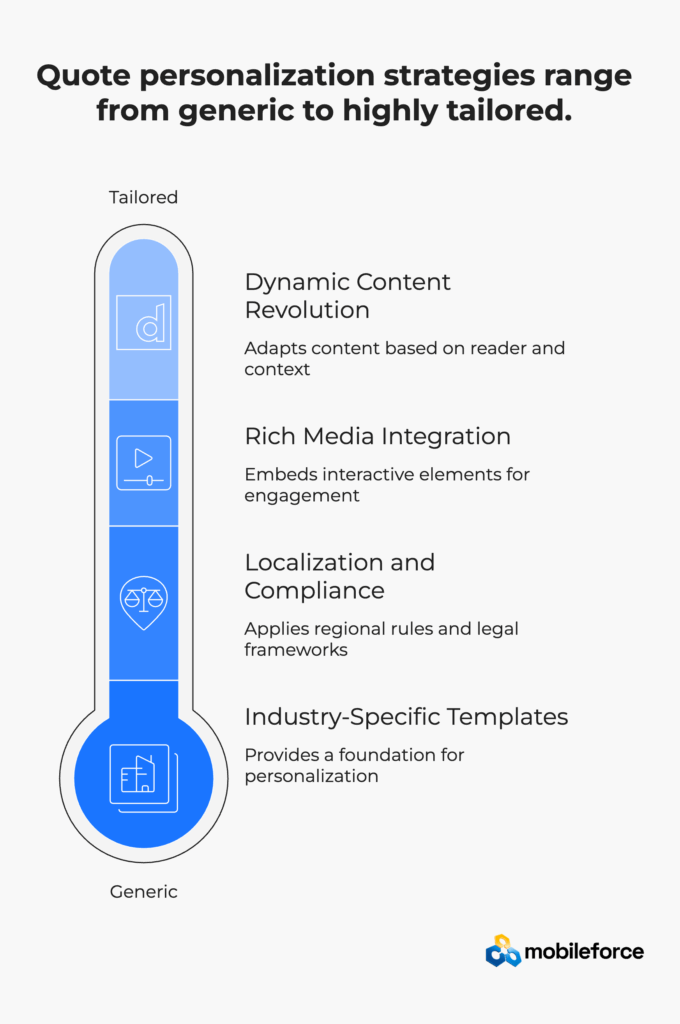
Pricing represents the most sensitive aspect of quote personalization, yet it’s where companies often see the biggest impact on revenue and profitability. McKinsey’s pricing research demonstrates that a 1% improvement in pricing yields an 8-11% increase in operating profits for most companies.
Tiered Discount Structures enable sophisticated pricing strategies that reward customer loyalty while maintaining competitive positioning. Rather than applying blanket percentage discounts, modern CPQ platforms calculate customer-specific rates based on multiple variables: contract length, volume commitments, payment terms, and strategic value. A customer agreeing to a three-year contract with quarterly payments receives different pricing than one requesting month-to-month terms with net-60 payment schedules.
Dynamic Competitive Pricing helps sales teams respond to market pressures without sacrificing profitability. When the system detects competitive situations—perhaps through CRM opportunity data or sales rep input—it can automatically suggest aggressive pricing within approved parameters. This capability proves especially valuable in commodity markets where price sensitivity often determines winners.
Volume-Based Calculations become increasingly sophisticated as CPQ platforms analyze usage patterns and growth trajectories. Instead of simple quantity breaks, modern systems consider seasonal fluctuations, growth rates, and usage trends to recommend optimal pricing structures. A SaaS company might offer different per-user rates based on projected growth, while a manufacturing firm adjusts pricing based on delivery schedules and inventory requirements.
Contract Renewal Optimization represents an often-overlooked opportunity for personalization. CPQ systems track contract performance, usage patterns, and satisfaction metrics to recommend renewal pricing that maximizes retention while reflecting delivered value. Customers who consistently exceed usage thresholds might receive volume discounts, while those with strong satisfaction scores could see loyalty rewards reflected in their renewal quotes.
Pricing Strategy | Impact on Deal Value | Implementation Complexity | Revenue Protection |
Tiered Discounts | 15-25% increase | Medium | High |
Competitive Response | 10-20% preservation | Low | Medium |
Volume-Based Pricing | 20-35% increase | High | High |
Renewal Optimization | 30-45% retention improvement | Medium | Very High |
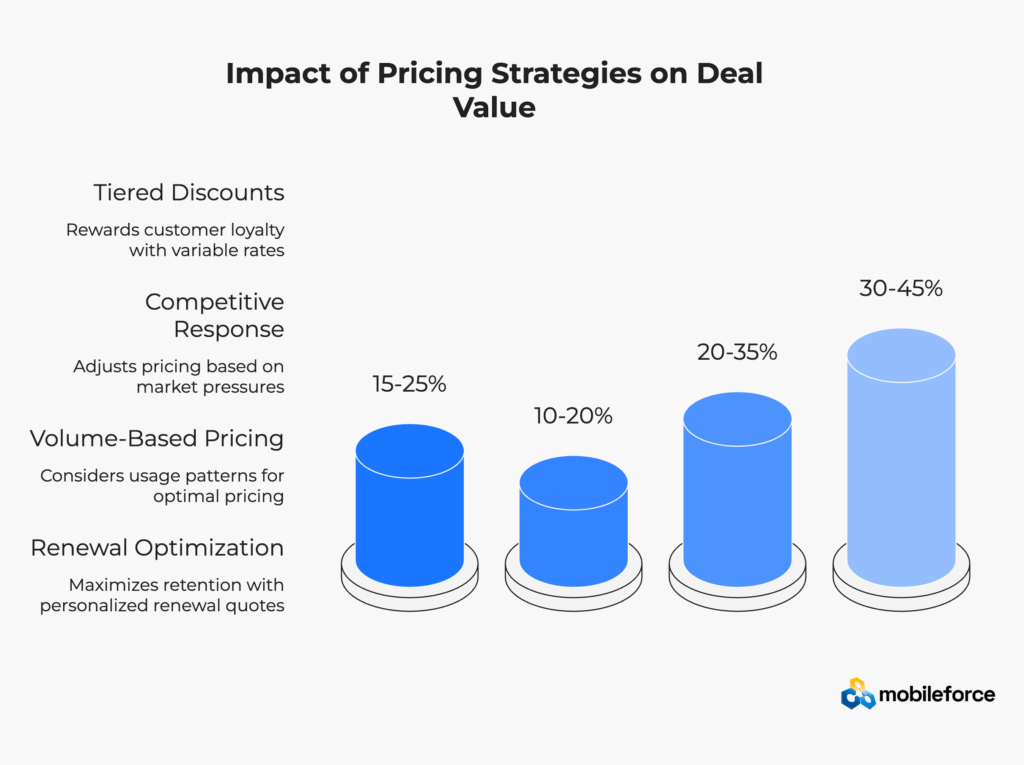
The business case for quote personalization extends beyond simple close rate improvements. Organizations implementing comprehensive personalization strategies see transformational changes across multiple performance metrics that compound over time.
Sales Velocity Acceleration emerges as one of the most immediate benefits. Sales Hacker’s 2024 benchmarking study shows that companies with automated quote personalization reduce average sales cycle length by 32%. When sales reps can generate accurate, compelling quotes in minutes rather than hours or days, prospects receive proposals while their interest remains high. This speed advantage often determines winners in competitive situations where timing matters as much as pricing.
Deal Size Expansion occurs naturally when quotes include relevant add-ons and complementary products. Rather than hoping sales reps remember to suggest additional items, CPQ systems automatically recommend solutions based on customer profiles and past purchasing patterns. A telecommunications company might see network security add-ons suggested for healthcare prospects, while retail customers receive point-of-sale integration recommendations. These intelligent suggestions typically increase average deal size by 18-25%.
Customer Satisfaction Improvements reflect the buyer’s appreciation for relevant, professional proposals. When quotes demonstrate deep understanding of customer requirements and industry challenges, prospects feel more confident in vendor selection. Forrester’s customer experience research indicates that companies with superior quote experiences see 60% higher customer lifetime value and 50% better retention rates.
Competitive Differentiation becomes especially pronounced in commoditized markets where product features offer limited distinction. Personalized quotes that demonstrate understanding of specific customer challenges often overcome price disadvantages. A manufacturing equipment supplier might win deals despite higher pricing by showing detailed implementation timelines, training programs, and support structures tailored to the prospect’s operational requirements.
Transform your sales performance with intelligent quote personalization. Book a strategy session to explore implementation approaches for your industry.
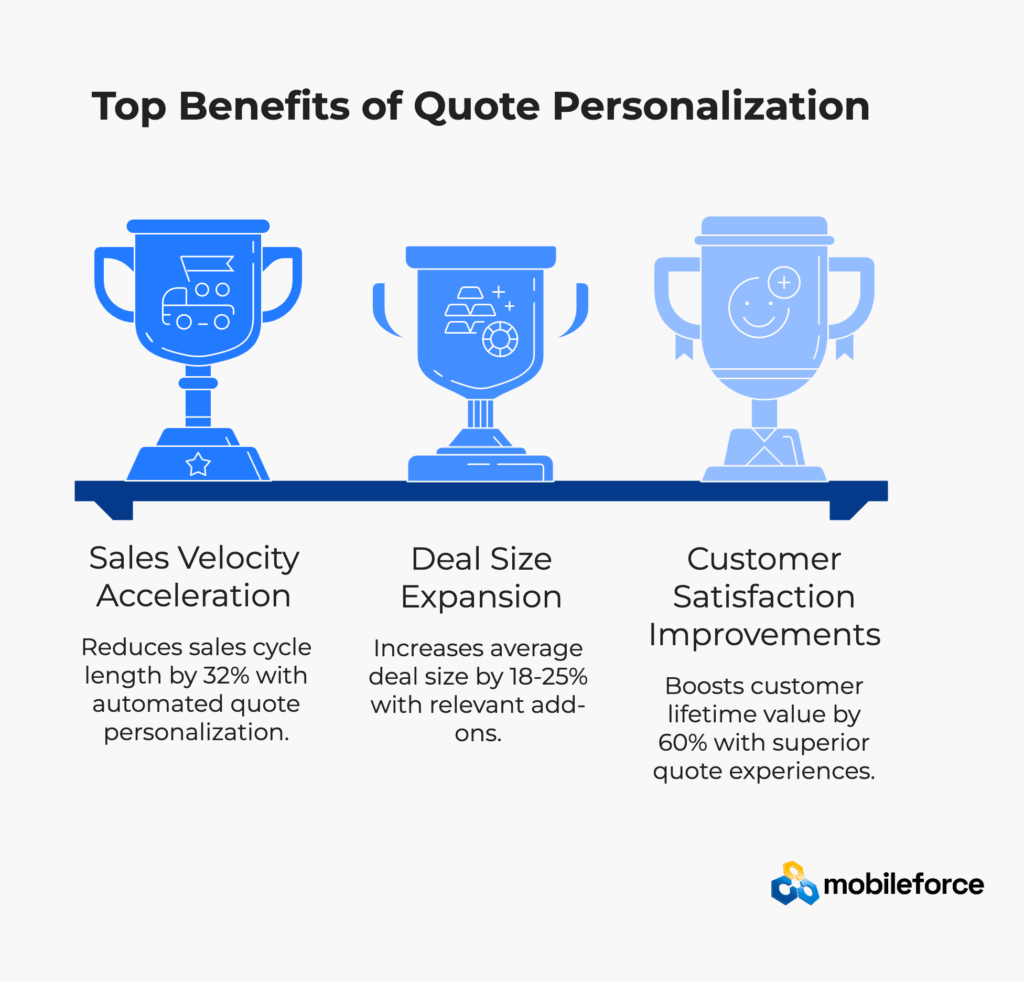
Most organizations encounter predictable obstacles when implementing quote personalization at scale. Understanding these challenges upfront enables proactive solutions that accelerate time-to-value and reduce implementation risks.
Manual Approval Bottlenecks represent the most common frustration point for sales teams. Traditional approval processes route every non-standard quote through multiple stakeholders, creating delays that kill deal momentum. Modern CPQ platforms address this challenge through intelligent approval workflows that automatically escalate only exceptional situations. Routine price adjustments within approved parameters flow through instantly, while significant deviations trigger appropriate review processes with clear escalation timelines.
Disconnected System Integration creates data silos that undermine personalization effectiveness. When customer information lives in CRM systems, pricing data resides in ERP platforms, and product details exist in separate catalogs, creating cohesive quotes becomes nearly impossible. Successful implementations prioritize API-driven integration strategies that create single sources of truth for customer data, pricing rules, and product configurations.
Static Template Limitations constrain personalization possibilities when content management relies on fixed document formats. Organizations often discover that their existing proposal templates can’t accommodate dynamic content insertion or conditional logic. The solution involves redesigning quote templates as flexible frameworks that support variable content blocks, conditional sections, and responsive formatting across different output channels.
Field Sales Accessibility becomes critical as sales teams increasingly work from remote locations and customer sites. Traditional desktop-based CPQ solutions leave field reps unable to generate quotes during customer meetings, forcing them to delay proposals until returning to the office. Mobile-first CPQ platforms enable real-time quote generation from any device, allowing sales reps to close deals during initial customer conversations.
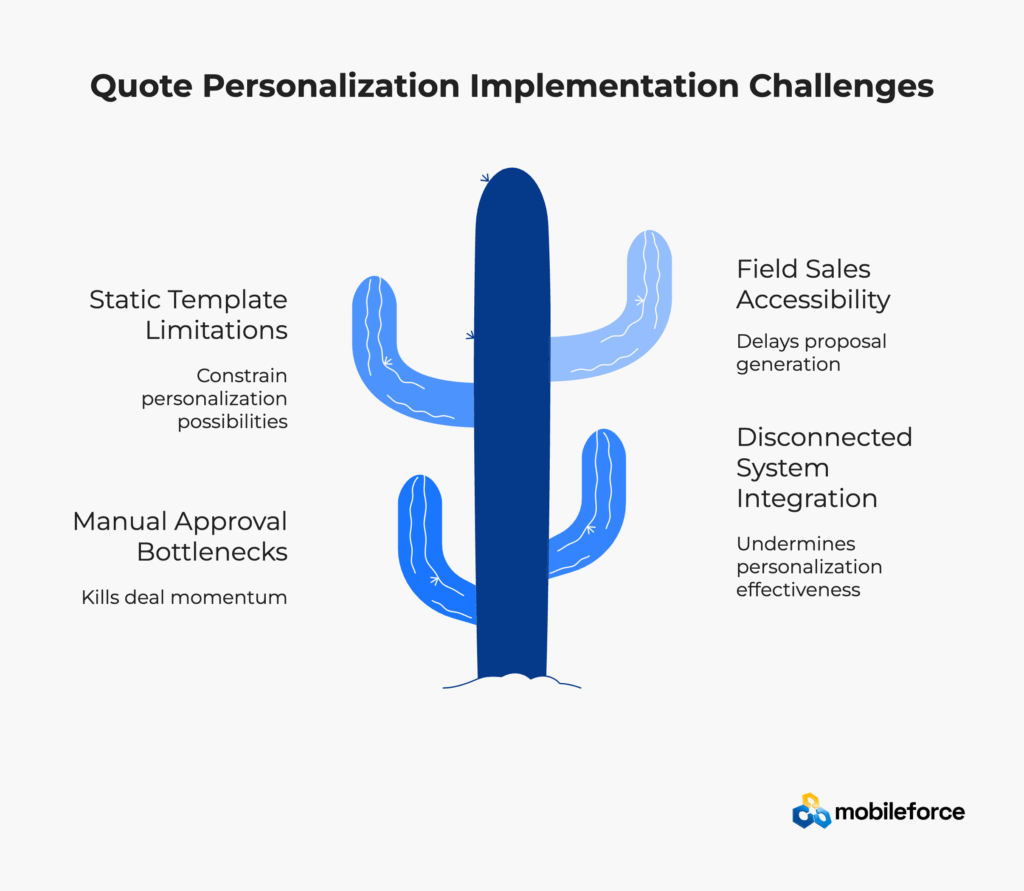
Effective quote personalization requires robust technological infrastructure that supports complex business rules while maintaining user-friendly interfaces. The most successful implementations balance sophisticated capabilities with intuitive operation that doesn’t require extensive training.
Rules Engine Architecture serves as the brain of personalization systems, processing multiple data inputs to determine appropriate content, pricing, and product recommendations. Unlike simple if-then logic, modern rules engines support complex decision trees that consider multiple variables simultaneously. A quote for a healthcare organization might trigger different pricing based on patient volume, compliance requirements, geographic location, and existing technology investments—all calculated automatically based on predefined business rules.
Real-Time Data Integration ensures personalization decisions reflect current information rather than stale data snapshots. Customer credit ratings, contract status, inventory levels, and competitive intelligence all influence quote personalization, and these factors change frequently. APIs enable continuous data synchronization between CPQ platforms and enterprise systems, ensuring every quote reflects the latest customer and product information.
Content Management Sophistication enables marketing teams to continuously optimize quote materials without IT intervention. Modern CPQ platforms include content versioning, A/B testing capabilities, and performance analytics that show which materials generate the highest engagement and conversion rates. Marketing teams can update case studies, product descriptions, and competitive positioning materials with immediate impact across all sales channels.
Mobile-First Design acknowledges the reality of modern sales environments where reps frequently work from customer locations, trade shows, and remote offices. Mobile-optimized CPQ interfaces provide full functionality without compromising on features or requiring simplified workflows. Sales reps can configure complex products, apply customer-specific pricing, and generate professional quotes entirely from mobile devices.
Technology Component | Business Impact | Implementation Priority | Integration Complexity |
Rules Engine | High automation capability | Critical | Medium |
Real-Time Integration | Data accuracy and relevance | High | High |
Content Management | Marketing agility | Medium | Low |
Mobile Interface | Field sales productivity | High | Medium |
Explore cutting-edge CPQ technology that scales with your business. Schedule a technical demo to see advanced personalization capabilities.
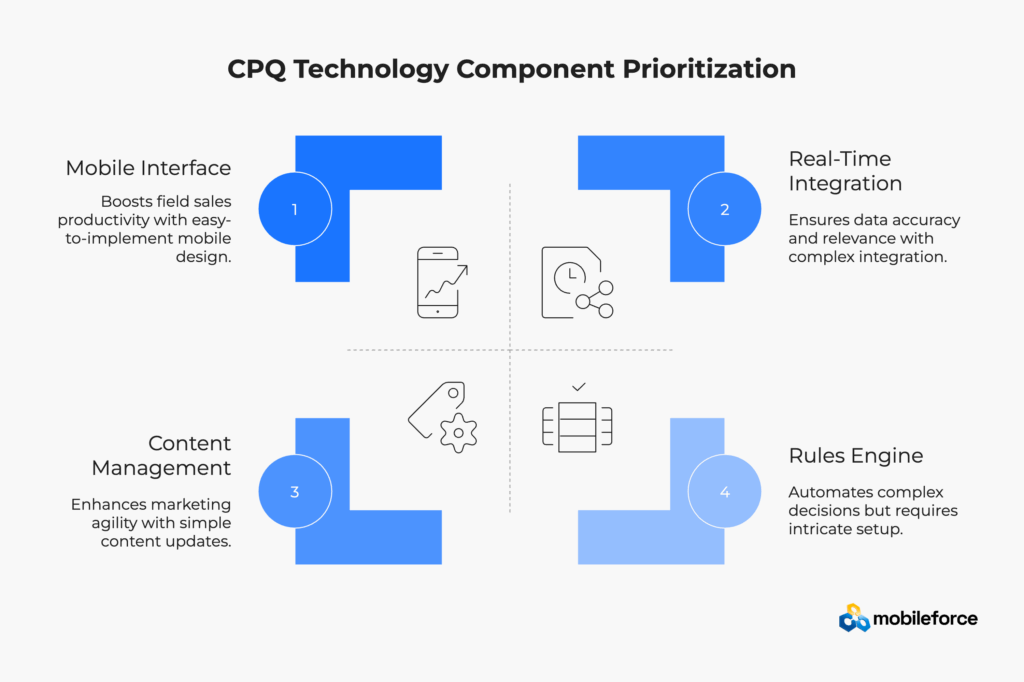
Successful quote personalization initiatives follow proven methodologies that minimize risk while maximizing business impact. These best practices reflect lessons learned from hundreds of implementations across diverse industries and company sizes.
Phased Deployment Strategy prevents overwhelming users with too many changes simultaneously. Most successful implementations begin with basic personalization features—customer-specific pricing and simple content selection—before advancing to sophisticated dynamic recommendations and complex approval workflows. This approach allows teams to build confidence and expertise gradually while delivering immediate value to sales organizations.
Cross-Functional Collaboration ensures all stakeholders contribute to personalization success. Sales teams provide insights into customer requirements and competitive dynamics. Marketing teams contribute content expertise and brand guidelines. IT teams ensure technical integration and security compliance. Finance teams establish pricing rules and approval thresholds. Regular collaboration sessions prevent misaligned expectations and accelerate problem resolution.
Performance Measurement Framework establishes clear metrics for evaluating personalization effectiveness. Beyond simple close rate improvements, successful organizations track quote generation time, approval cycle length, customer engagement metrics, and sales rep adoption rates. These measurements guide continuous optimization and justify continued investment in personalization capabilities.
Change Management Investment addresses the human side of technology adoption that often determines success or failure. Sales reps comfortable with existing processes may resist new systems, especially if training feels inadequate or workflows seem more complex. Comprehensive training programs, peer mentoring systems, and clear communication about business benefits help ensure enthusiastic adoption rather than reluctant compliance.
Data Quality Governance underpins all personalization efforts since poor data quality produces irrelevant or incorrect personalization decisions. Organizations must establish clear data ownership, regular quality audits, and standardized data entry processes. Customer segmentation, product categorization, and pricing rule definitions require ongoing maintenance to remain effective as business conditions evolve.
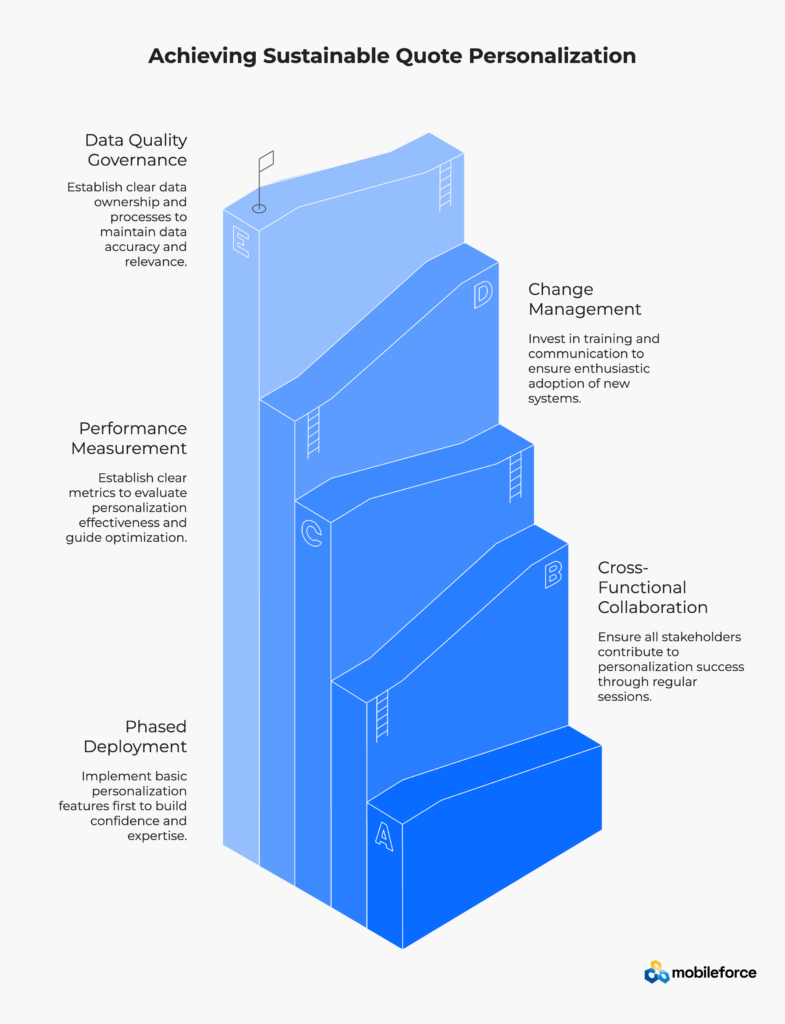
Different industries face unique challenges and opportunities when implementing quote personalization, requiring tailored approaches that reflect specific business models and customer expectations.
Software and Technology Companies benefit from sophisticated product configuration capabilities that allow customers to explore different solution architectures during the quoting process. Interactive configurators let prospects adjust user counts, feature sets, and integration requirements while seeing real-time pricing impacts. Subscription-based pricing models require sophisticated calculation engines that handle complex terms like annual commitments, usage overages, and multi-year discounts.
Manufacturing Organizations often deal with complex product variations, custom specifications, and supply chain considerations that significantly impact pricing and delivery timelines. CPQ systems must integrate with ERP platforms to access real-time inventory data, manufacturing capacity, and supplier pricing. Customer-specific pricing might reflect long-term supply agreements, volume commitments, or strategic partnership arrangements that require sophisticated calculation logic.
Professional Services Firms face unique challenges around resource allocation, skill-based pricing, and project scope definition. Personalization in this context involves automatically suggesting appropriate team compositions, skill levels, and project methodologies based on client requirements and past engagements. Time and materials pricing requires sophisticated rate calculations that consider seniority levels, geographic locations, and client-specific agreements.
Financial Services Organizations must navigate complex regulatory requirements while delivering competitive pricing that reflects risk assessments and relationship value. Quote personalization might involve automatic compliance checking, regulatory disclosure generation, and risk-adjusted pricing calculations. Integration with credit scoring systems, regulatory databases, and internal risk management platforms ensures quotes meet all legal requirements while optimizing profitability.
See how industry-leading companies achieve personalization success. Request a case study consultation relevant to your sector.
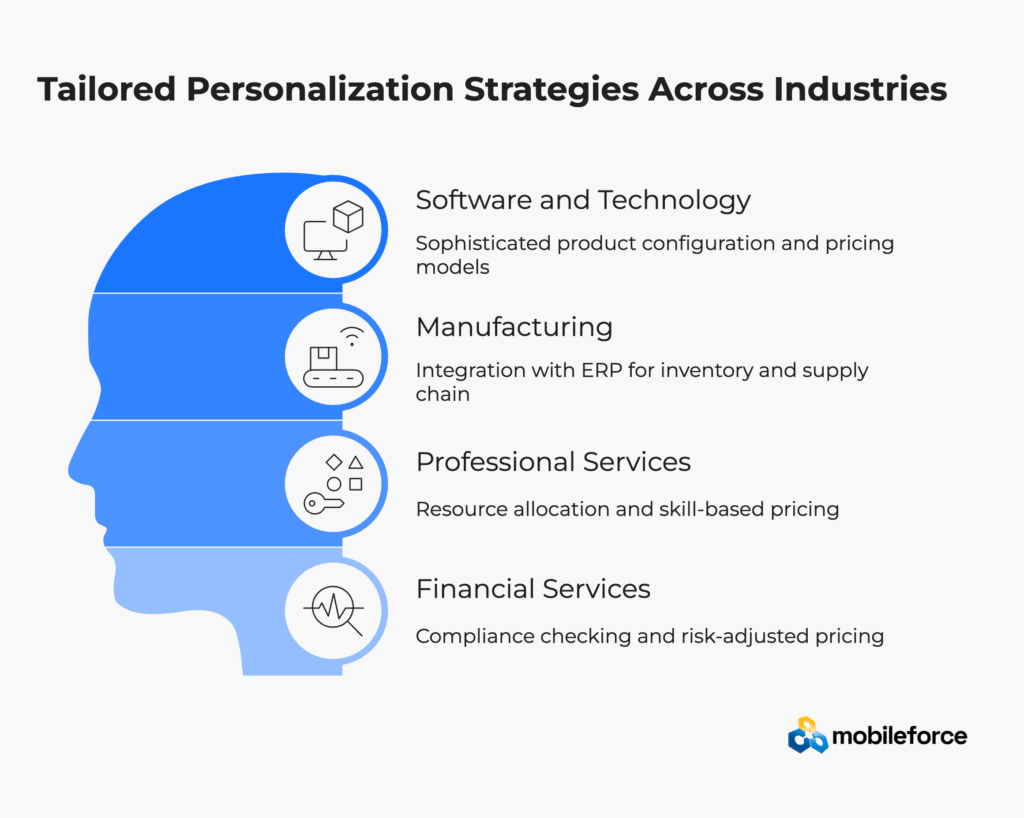
The evolution of quote personalization continues accelerating as new technologies and changing buyer expectations drive innovation. Organizations planning long-term personalization strategies should consider emerging trends that will shape future capabilities, including integration with artificial intelligence and automation that promise to revolutionize how quotes are generated and optimized.
Artificial Intelligence Integration promises to revolutionize personalization through predictive analytics and machine learning algorithms. AI systems can analyze historical quote data to identify patterns that predict customer preferences, optimal pricing strategies, and successful content combinations. Natural language processing enables automatic content generation that adapts messaging tone and technical depth based on recipient profiles.
Conversational Commerce reflects changing buyer preferences for interactive, dialogue-driven purchasing experiences. Future CPQ platforms may integrate chatbot capabilities that guide prospects through product selection and configuration processes. Voice-activated quote generation could enable sales reps to create proposals through spoken commands, dramatically reducing manual effort while maintaining personalization quality.
Augmented Reality Applications open new possibilities for product visualization and customer engagement. Manufacturing companies might embed AR experiences into quotes that let prospects visualize equipment installations in their facilities. Software companies could provide AR demonstrations of user interfaces and workflow improvements directly within proposal documents.
Blockchain Integration addresses growing concerns about quote authenticity and pricing transparency. Blockchain-based quote verification could eliminate concerns about unauthorized pricing changes while providing immutable audit trails for compliance purposes. Smart contracts might automatically execute certain quote approvals based on predefined criteria.
Ecosystem Personalization expands beyond individual quotes to encompass entire partner and channel relationships. Future CPQ platforms will personalize not just customer-facing quotes but also partner pricing, channel incentives, and distributor agreements. This comprehensive approach ensures consistent personalization across all sales channels while maintaining appropriate confidentiality.
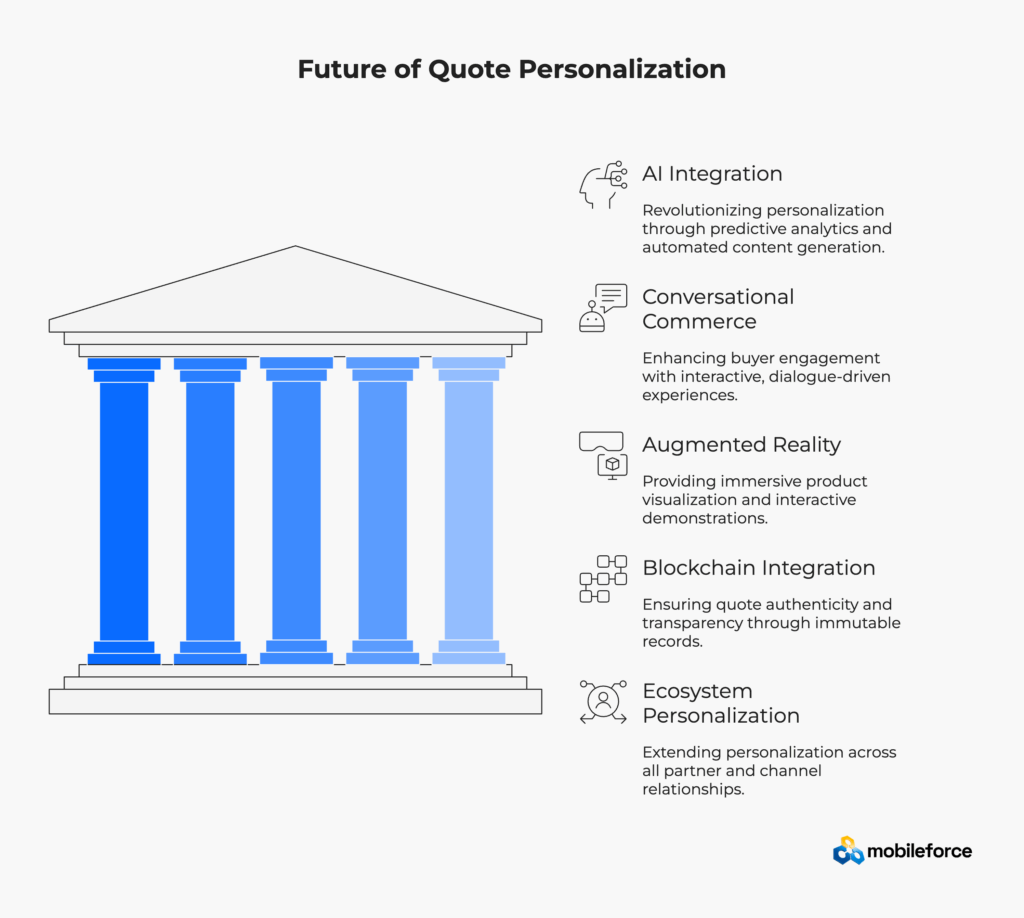
Effective quote personalization initiatives require comprehensive measurement frameworks that track both leading and lagging indicators of success. Organizations must balance immediate performance metrics with longer-term strategic objectives.
Primary Performance Indicators focus on direct sales impact metrics that demonstrate immediate ROI. Quote-to-close conversion rates provide the most direct measure of personalization effectiveness, while average deal size indicates whether personalization drives larger transactions. Sales cycle length measurements show whether personalization accelerates decision-making processes.
Operational Efficiency Metrics evaluate process improvements that reduce costs and increase sales team productivity. Quote generation time per proposal measures efficiency gains from automation and streamlined workflows. Approval cycle length indicates whether workflow optimization reduces administrative overhead. Sales rep adoption rates show whether teams embrace new capabilities or resist change.
Customer Experience Indicators assess buyer satisfaction with personalized proposal experiences. Quote engagement metrics—time spent reviewing proposals, sections accessed most frequently, and follow-up question patterns—provide insights into content effectiveness. Customer feedback scores specifically related to proposal quality help identify areas for improvement.
Revenue Quality Measurements evaluate whether personalization improves deal profitability and customer lifetime value. Margin analysis by personalization type shows which strategies generate the most profitable business. Customer retention rates for personalized versus generic quotes indicate long-term relationship impacts.
Metric Category | Key Indicators | Measurement Frequency | Target Improvement |
Sales Performance | Conversion rate, deal size, cycle time | Monthly | 20-30% improvement |
Operational Efficiency | Generation time, approval cycles | Weekly | 40-60% reduction |
Customer Experience | Engagement scores, feedback ratings | Quarterly | 25-35% increase |
Revenue Quality | Margins, retention rates | Quarterly | 15-25% improvement |
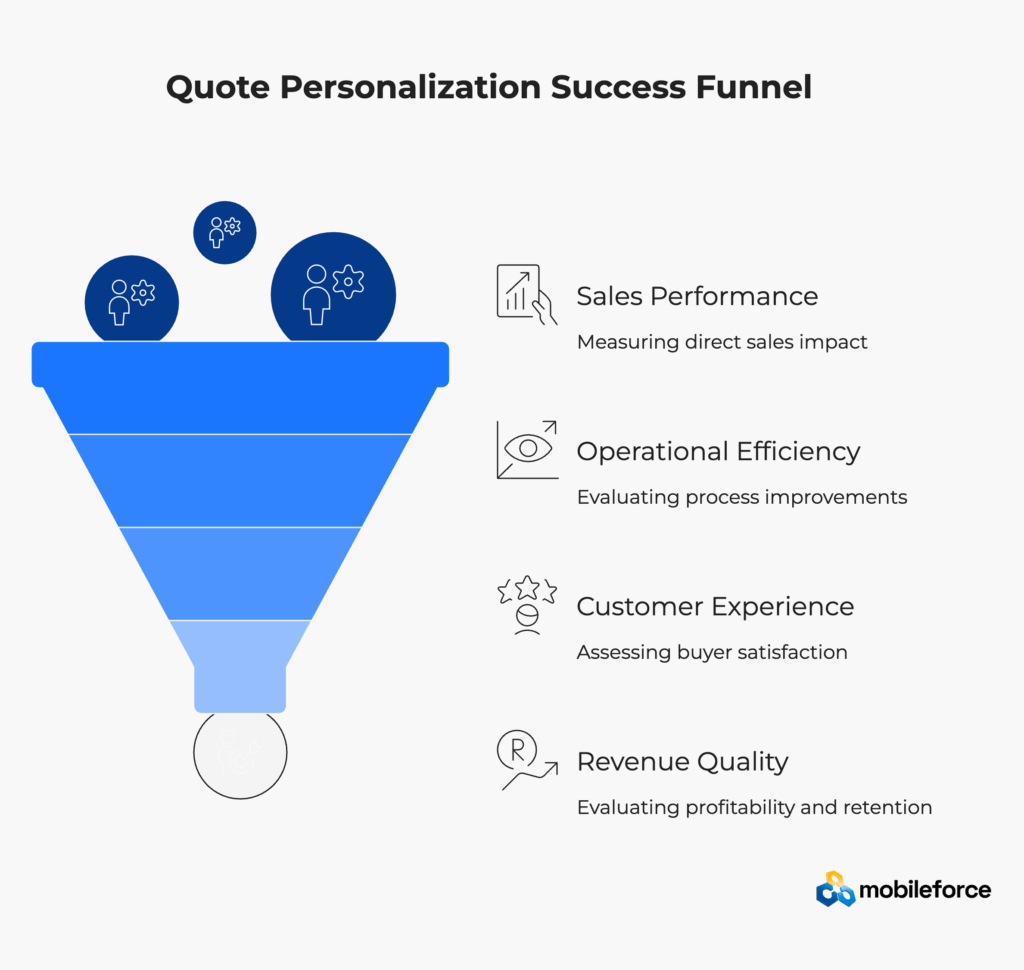
Quote personalization represents a fundamental shift from one-size-fits-all proposals to intelligent, customer-specific experiences that drive measurable business results. Organizations implementing comprehensive personalization strategies see significant improvements in close rates, deal sizes, and sales cycle efficiency while building stronger customer relationships through relevant, professional proposals.
The technology foundation for effective personalization continues evolving rapidly, with AI-driven insights, mobile-first interfaces, and sophisticated integration capabilities enabling unprecedented levels of customization at scale. Success requires balancing technological sophistication with user-friendly operation, ensuring sales teams embrace new capabilities rather than viewing them as additional complexity.
Industry-specific approaches acknowledge that personalization strategies must reflect unique business models, customer expectations, and operational requirements. Manufacturing companies face different challenges than software firms, and effective CPQ platforms accommodate these differences through flexible configuration and industry-specific templates.
Implementation success depends heavily on change management, cross-functional collaboration, and continuous optimization based on performance data. Organizations that invest in comprehensive training, establish clear success metrics, and maintain ongoing improvement processes achieve significantly better results than those treating personalization as a one-time technology deployment.
The future of quote personalization points toward even more sophisticated capabilities driven by artificial intelligence, conversational interfaces, and ecosystem-wide personalization across all customer touchpoints. Companies establishing strong personalization foundations today position themselves to take advantage of these emerging capabilities as they mature.
Ready to transform your quoting process with intelligent personalization? Schedule your personalized demo to see how leading organizations drive revenue growth through dynamic quote experiences.
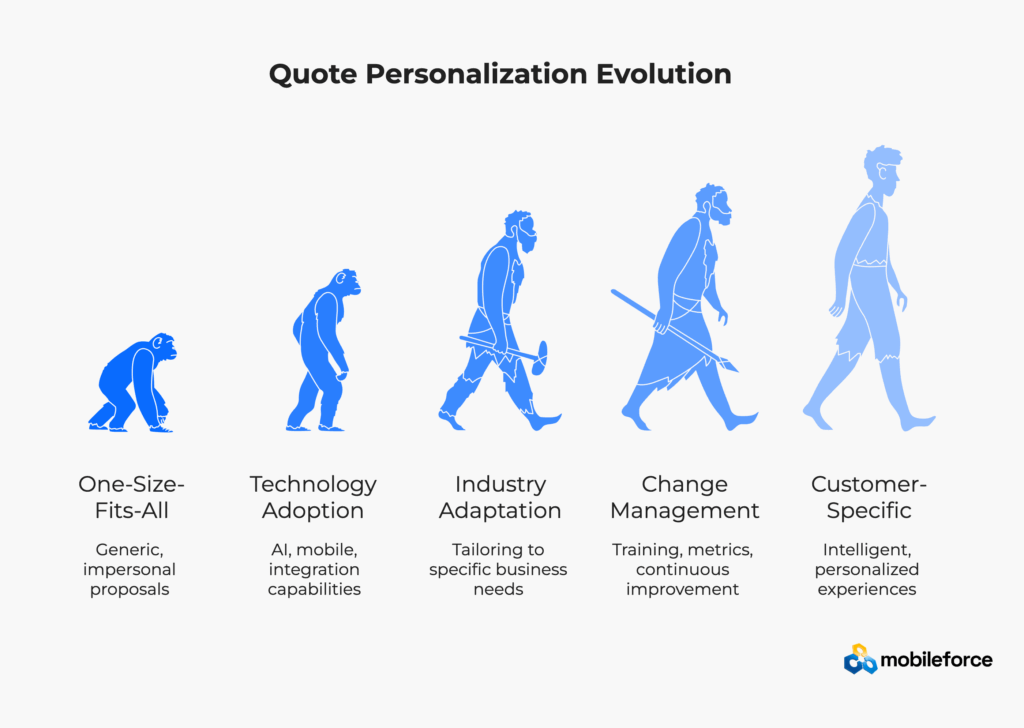
Quote personalization involves automatically adapting content, pricing, and recommendations based on customer data and predefined rules, while customization typically requires manual modifications for each proposal. Personalization scales efficiently across large sales organizations, whereas customization depends on individual sales rep effort and expertise.
Implementation timelines vary based on system complexity and integration requirements, but most organizations see initial personalization capabilities within 4-6 weeks. Full-featured implementations with complex approval workflows and extensive integrations typically require 12-16 weeks. Phased deployment approaches can deliver value incrementally throughout the implementation process.
Modern CPQ platforms offer extensive integration capabilities that work with most major CRM and ERP systems including Salesforce, Microsoft Dynamics, HubSpot, SAP, and Oracle. API-based integrations ensure real-time data synchronization while maintaining existing system investments and user workflows.
Leading CPQ platforms provide no-code rule builders that enable business users to create and modify personalization logic without programming knowledge. While complex scenarios may require technical support, most day-to-day personalization management can be handled by sales operations or marketing teams with basic training.
Robust approval workflows, automated validation rules, and audit trails prevent pricing errors while maintaining personalization flexibility. CPQ systems can enforce minimum margins, maximum discount thresholds, and competitive pricing boundaries automatically. Exception reporting identifies unusual pricing patterns for manual review.
Enterprise CPQ platforms include role-based access controls, encryption for data transmission and storage, and audit trails for all pricing decisions. Customer-specific pricing rules can be configured with appropriate security restrictions to ensure only authorized personnel access sensitive information.
ROI measurement focuses on improved close rates, larger deal sizes, shorter sales cycles, and reduced administrative overhead. Most organizations see 20-30% improvement in conversion rates and 15-25% reduction in quote generation time. Customer satisfaction improvements and sales rep productivity gains provide additional value that compounds over time.
Advanced CPQ platforms excel at managing complex product configurations through guided selling interfaces, compatibility rules, and automated recommendations. Interactive product configurators allow customers to explore options while ensuring all selections remain technically feasible and properly priced.
Modern CPQ systems include version control and change management capabilities that ensure personalization rules remain effective as business conditions evolve. Automated testing and validation features identify potential issues before changes go live, while bulk update capabilities enable efficient rule modifications across multiple products or customer segments.
Successful implementations include comprehensive training programs that emphasize business benefits rather than just technical features. Change management support, peer mentoring, and gradual feature rollouts help ensure enthusiastic adoption. Most sales teams report increased confidence and efficiency once they become comfortable with personalization capabilities.